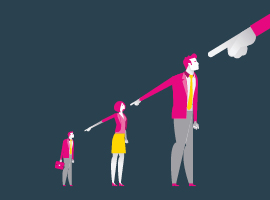In Germany, we have a culture of argumentativeness and blame. We notice this not just in times of crisis. After all, someone has to be blamed for the coronavirus dragging our country into the abyss again, making us look bad in comparison with some other countries. But is it really our politicians, the unvaccinated, the careless, and mass events that are to be blamed for the fact that we just can’t get out of the high coronavirus numbers? And will we ever get out of the crisis with our vicious search for a guilty party and the futile search for solutions? Isn’t it finally time for everyone to pull together and declare war on the virus with joint strength, reason, and expertise? Wouldn’t we be much further along if, instead of getting caught up in endless discussions, we simply stepped out of our comfort zone for once and reflected on our own behavior? What if we behaved every day as scientists and politicians have been preaching about for months? The solution is on the table, but too many people are shaking the plan’s building blocks. And so one brick after another topples—a true domino effect. If someone doesn’t follow the rules because they don’t understand them or don’t trust those who made them, then the next person won’t either. And so the building blocks don’t work, and we head towards chaos. More than half of us have recognized this and are trying to save what can still be saved. But the domino effect can only be stopped if someone stands in the way, stopping the mass that threatens to topple it over, and puts it back on the right track. What has already fallen behind cannot be salvaged, but there could be a common solution for what lies ahead through cohesion in our society. A solution can be in our hands that requires every mind and every hand to ultimately steer us out of the crisis. This applies to the coronavirus crisis, as well as the climate crisis, and all others yet to come.
Unfortunately, it’s not that simple. In many areas, working together on something, sometimes submitting to someone else’s opinion and expertise, and trusting that this solution is more promising has become increasingly inconceivable. After all, it’s a matter of dealing only with guilty parties. Instead of learning from mistakes and drawing strength from them to finally lend a hand, mistakes are seen as a conscious threat. Looking back is transformed into negative energy, accusations, and insinuations. In the end, it’s often no longer a question of fighting the crisis, but fighting a potential culprit, the enemy.
Doesn’t this process take place nearly the same everywhere? There are no second chances. If a football team loses, the coach is fired. If the virus cannot be contained by our misbehavior, politicians should resign. If an IT project is not successfully completed on time or on budget, the project manager or people responsible should look for a new job. It’s often only a matter of legally safeguarding your own behavior to keep your damage as low as possible in case of any mistakes. We see the same thing when new companies are founded. Our tolerance for error is often less than zero. Founders whose ideas have previously failed are considered losers instead of visionaries or geniuses. We only apply this attribute to failed inventors from other countries. Someone who invents a vaccine or an electric car in Germany is considered suspect and doomed to failure.
We have to learn to trust ourselves and others again, put aside our omnipresent skepticism, and continuously reflect on our own behavior. “What can I do to make sure that this project is completed successfully?” That should be the question we ask ourselves daily, instead of constantly accusing others who are actively working on solutions of misconduct or greed for power. We need to learn to admit our own mistakes and those of others, motivate each other again, and analyze situations to work out better solutions. Be willing to contribute and to take over ownership instead of always criticizing.
Guilt is a concept with a wide scope. It has moral, ethical, and legal significance. When blaming someone, you are implying that they have intentionally or deliberately acted wrongly to harm others. Those who are at fault can be held accountable and need to pay compensation for the behavior that’s caused harm to others, or otherwise make up for the harm.
The term “error” is different. Here, someone has made a decision based on the current state of affairs, their own competence, or experience, which may turn out to be wrong in the end. However, their behavior was fundamentally characterized by good intentions. Only the circumstances have changed or were not previously known or analyzed in their entirety. To put it more concretely, someone using their position to get rich from selling security articles due to high demand bears both the moral and legal blame for their behavior and must be prosecuted for it. But if someone with good intentions makes protective mechanisms freely available to all, intending to help protect individuals and their community from greater dangers, is not guilty, not everyone accepts this offer. The blame for the crisis lies with those who don’t want to take the community’s security into consideration either. It would be a mistake to deviate from the plan to protect the community. Therefore, new measures must be defined in order to achieve this goal.
Going back to the working world: Mistakes don’t always have to have far-reaching consequences where someone suffers lasting damage. In private life and in work, mistakes happen that aren’t caused intentionally. But anyone who doesn’t comply with certain rules and breaks them will be reprimanded. In practice, you can describe it like this:
Someone who never changes their password or installs third-party software on their laptop despite IT security guidelines risks a warning. But someone who cannot keep to the costs or schedule due to unexpected events in their IT projects can only be blamed for not carrying out sufficient risk management, being coordinated enough, or planning enough buffers. Their behavior was characterized by good intentions and the person will have to take responsibility for their task and make suggestions on how the project can be brought to a peaceful conclusion. Often, this kind of situation ends with blame and excuses. The customer had last-minute changes. The purchasing department ordered the hardware too late. Their colleague had software errors, and so on. Instead of turning the wheel of errors in reverse gear, it calls for commitment and a sense of community.
Rather than questioning new milestones, everyone pulls in the same direction. It’s teamwork instead of a crisis meeting. In the spirit of agile working methodology, everyone works hand in hand, makes sustainable decisions, and discusses the changes together without getting lost in them. If necessary, making adjustments more frequently is preferable, instead of only noticing the weak points once you reach the deadline. Continuous self-reflective learning processes creates an atmosphere allowing us to make mistakes. They are discovered more quickly and usually don’t have any long-term negative consequences.
Many organizations are already using integrative practices even at higher levels (such as DevOps) for continuous code integration and delivery. This puts a new focus on all customer-facing processes. In other organizations, managers who need to take responsibility for their actions may not be ready to, given the cross-functional nature of agile teams. This is a classic blame avoidance. If experimentation isn’t part of the culture, then agile working cannot succeed. Managers must take responsibility for their end product and defend the outcome, even if it wasn’t developed with their explicit input, and established standard operating procedures can’t be relied on. Iteration during the development process doesn’t replace accepting responsibility. But it can replace a culture of assigning blame. Ultimately then, everyone is to blame. Obviously, this approach is not practical for everyone.
On the contrary, in an agile team, you work with the same values and goals and look at a common project from different perspectives. This can be very liberating. Above all, it frees you from blaming others. No matter who tries to blame someone for something, the effects are always negative for everyone involved. A solution for the actual problem isn’t found like this. Therefore, an agile way of working would also be good in public administration, politics, or even in a family. After all, it opens up the view of the whole and lets us continuously reward ourselves and our own behavior. People who admit their mistakes and offer new, well-thought-out solutions can contribute significantly more to crisis management than those who place the blame or problem on others. Error tolerance instead of error avoidance would do our work culture a lot of good. At the moment, it seems we are still a long way from that.




